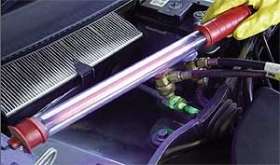FRANKFURT (Reuters) -- A key German government body said it has proposed Brussels grant Daimler AG until the end of 2015 to meet new European Union laws mandating the use of climate-friendly air conditioning refrigerants in cars.

In a bid to broker a dispute between Daimler on the one side, and the EU and the rest of the auto industry on the other, federal environment agency UBA on Thursday called for the German carmaker to be granted an extension if it agrees to introduce carbon dioxide as a non-chemical refrigerant alternative.
Since the start of this year, Daimler has been in violation of an EU directive to use a refrigerant produced by U.S. supplier Honeywell Inc. and DuPont Co. known as HFO-1234yf, on the grounds it could pose a significant fire safety risk.
"If you switch to CO2 then you reduce your global warming potential by 75 percent over HFO-1234yf, so I think that justifies permitting a longer transition time for those carmakers that commit to the switch," UBA President Jochen Flasbarth told Reuters in an interview.
Back in 2006, the EU passed a directive governing the phase-out that started this year of the automotive air conditioning refrigerant R134a, which has the potential to warm the climate 1,400 times more than normal carbon dioxide.
In order to comply with the rule, carmakers agreed amongst themselves to adopt the refrigerant jointly developed and produced by Honeywell and DuPont, a move that could allow the conglomerates to effectively monopolize the burgeoning market.
Opposition in Germany grown has grown in recent months to the product after Daimler argued that, unlike the still widely-used R134a, it can start a fire in the car and release toxic hydrogen fluoride gas in the process.
Earlier this month, BMW joined Daimler and Volkswagen's Audi in resigning from an industry research group looking into the safety of HFO-1234yf, due to concerns over the scientific thoroughness of the investigation.
"We have been warning about the dangers (of HF0-1234yf) for years. Daimler's internal tests proved not only that our own fears were justified but also that we may even have underestimated the risks," Flasbarth said.
German carmakers initially favored CO2 as a refrigerant only to abandon development several years ago and fall in line with the rest of the industry, since the new alternative does not require a comprehensive and costly redesign of A/C systems.
Daimler received EU approval to sell three of its models in the bloc, on the grounds they utilized HFO-1234yf.
However, if it doesn't back down from its decision not to use the refrigerant, it could lose its ability to sell the cars in the EU, including the Mercedes A-Class. It needs the compact hatchback to close the sales gap with larger rivals BMW and Audi.
Volkswagen patriarch Ferdinand Piech told Auto Bild magazine in November that a CO2-based air conditioning system was in fact the better solution since it is inherently non-flammable.
He said VW would continue to use the existing R134a refrigerant until it can make the technological jump on an industrial scale.
"It's just not possible to switch to a CO2-based system within six months or even a year, though, so I would propose giving carmakers until the end of 2015 to make the switch," the UBA president said.
No support for argument
Opponents of carbon dioxide as refrigerant, however, argue it is not just the comprehensive and costly redesign of A/C systems that make it troublesome.
They cite safety concerns resulting from a possible leak. Enough CO2 escaping into the passenger cabin could cause drowsiness among occupants, increasing the risk of an accident.
Additionally, they say proponents of CO2 omit the indirect carbon emissions in their calculations, especially in warmer climates closer to the equator where the A/C runs more often.
More gasoline or diesel fuel is consumed by the engine to power a CO2-based A/C system, since it requires more energy to maintain sufficient internal pressure to keep carbon dioxide contained and in a liquid state.
"The UBA has a VW in our fleet equipped with a CO2 air-conditioner, for which we carefully measure the fuel consumption, and we cannot find evidence to support that argument," Flasbarth countered.
The UBA president said he planned to discuss the differences in opinion over HFO-1234yf with his counterparts at the Environmental Protection Agency in the United States in April.
Carmakers in the United States are granted credits towards lowering their average CO2 emissions by the EPA should they use HFO-1234yf instead of R134a.
